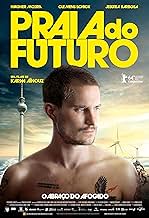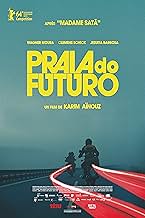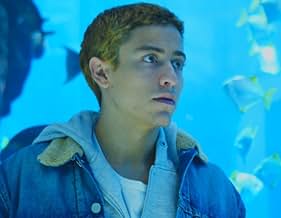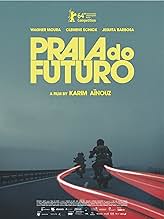IMDb रेटिंग
6.3/10
3.5 हज़ार
आपकी रेटिंग
अपनी भाषा में प्लॉट जोड़ेंShortly after failing to rescue a drowning man, Donato meets Konrad, a friend of the victim. They soon begin a relationship which seems doomed from the start, while Donato's past catches up ... सभी पढ़ेंShortly after failing to rescue a drowning man, Donato meets Konrad, a friend of the victim. They soon begin a relationship which seems doomed from the start, while Donato's past catches up with him.Shortly after failing to rescue a drowning man, Donato meets Konrad, a friend of the victim. They soon begin a relationship which seems doomed from the start, while Donato's past catches up with him.
- निर्देशक
- लेखक
- स्टार
- पुरस्कार
- 11 जीत और कुल 20 नामांकन
Demick Lopes
- Capitão Motta
- (as Démick Lopes)
Yannik Burwiek
- Filho de Heiko
- (as Yannik Burwieck)
Jesuíta Barbosa
- Ayrton - 18 anos
- (as Jesuita Barbosa)
फ़ीचर्ड समीक्षाएं
beautiful, bitter, useful. a film about relations and choices. delicate poetry and good performances. not comfortable but touching for its honesty, for the landscapes, for the dialogs and for the grace of silence. a film about love and its decision, about guilt feelings and about gestures who are only exercise to know happiness. about the responsibility. and about the past who remains the skin of present. short- a beautiful film. not in ordinary manner but that detail defines it. because it is the work of an admirable director who use the right nuances for a story who might be almost cruel. a gentle speech about the sense of life.
The thing that struck me the most about this movie is how beautiful it is, and I mean literally, aesthetically. Not only is the scenery gorgeous, but also its camera work is outstanding: Praia do Futuro's shots are absolutely amazing, most scenes could be made into pictures to be hung on the walls of an art gallery - there could probably be a whole exposition just made with screenshots of this movie.
The film's appeal, however, doesn't go much beyond that. Its plot had potential, the trailer made it seem like it would be intense and deeply emotional, yet the whole story is quite dull, with some unclear or poorly explained parts and underdeveloped dialogue. The characters don't lack depth per se, but their personalities were rather shallowly explored, perhaps hindered by the lack of vocal expression or by the stumbling plot.
Contrarily to what a review I read (in another website) suggested, I did not feel like this movie was too cliché-ridden, and the unoriginal moves were fairly understandable, as they could be justified by either the situation in which they were inserted or the characters' psyche. Yet, I feel the innovative elements were obscured by the overall dephtlessness of the whole production and great ideas and quotes were lost in senselessness and barely-existent dialogue.
This is definitely not a bad movie, it was just not enough to touch or affect me in any way.
The film's appeal, however, doesn't go much beyond that. Its plot had potential, the trailer made it seem like it would be intense and deeply emotional, yet the whole story is quite dull, with some unclear or poorly explained parts and underdeveloped dialogue. The characters don't lack depth per se, but their personalities were rather shallowly explored, perhaps hindered by the lack of vocal expression or by the stumbling plot.
Contrarily to what a review I read (in another website) suggested, I did not feel like this movie was too cliché-ridden, and the unoriginal moves were fairly understandable, as they could be justified by either the situation in which they were inserted or the characters' psyche. Yet, I feel the innovative elements were obscured by the overall dephtlessness of the whole production and great ideas and quotes were lost in senselessness and barely-existent dialogue.
This is definitely not a bad movie, it was just not enough to touch or affect me in any way.
Actually, this movie does not bring anything new to the Brazilian cinema.
I found its story totally lame. What about this synopsis after all? And it solely relies on the (already-way-too-mainstream) shocking sexually-appealing feature.
Also, German seems like the easiest language to be learned by a regular Brazilian, as the confusing time line does not allow to understand how long the main character spends on Germany. Same for his young brother, for whom the language-learning process has - again - a lame explanation.
Score is 3 out of 10 just for the few nice shots, even though the slowness of this movie is definitely boring.
I found its story totally lame. What about this synopsis after all? And it solely relies on the (already-way-too-mainstream) shocking sexually-appealing feature.
Also, German seems like the easiest language to be learned by a regular Brazilian, as the confusing time line does not allow to understand how long the main character spends on Germany. Same for his young brother, for whom the language-learning process has - again - a lame explanation.
Score is 3 out of 10 just for the few nice shots, even though the slowness of this movie is definitely boring.
An award-winning screenwriter once told me the secret to his success. It's knowing and never forgetting the essence of film (and this holds true for directors, actors, cinematographers, make-up artists, and production designers as well).
Simply put, "A movie is a story that's told with pictures. Pictures that move." Every line, every shot, every scene, every setting, every prop, should be informed by this.
Few films exemplify this as well as Karim Aïnouz' "Praia do Futuro." Ainouz has said, "For me film is time, space, and sound distilled in a moving image."
It's also, you can see clearly from this film, about bodies moving in time and space and within architecture.
(There's one memorable scene of muscular lifeguards training on the beach and then running into the sea that's right out of poet Walt Whitman's "I Sing the Body Electric.")
Every shot, every scene in this spare, visual style of storytelling is a work of art, which shouldn't be surprising as Ainouz came to film making in a roundabout way, leaving Fortaleza, Brazil (where the opening of "Praia do Futuro" is set) to study architecture in Brazil's futuristic capital, Brasilia. He then studied fine art in New York, took up painting and photography, only to finally study film in graduate school at NYU. He sees himself primarily as a visual artist.
This is a film about fear and courage, about risking it all. It's also about displacement and freedom. But, unlike Hollywood films, it never spells anything out. These ideas are dealt with elliptically and obliquely and usually through movement and visuals rather than through dialogue. The protagonists move through water and dance and speed-race motorcycles through breathtaking scenery and they make passionate, sensual love.
If you like things spelled out for you and wrapped up with a bow this is not the film for you. Much of what happens, happens off-screen. Characters don't talk about their feelings or reveal much through dialogue and the ending is cryptic. But pay attention: It's the visuals and motion and actions that reveal everything.
And about that ending--there is some actual "telling" rather than showing in the end (don't worry, it's not a spoiler) and it's so emblematic of the film I'll cite it here. As we see two motorcycles disappear into the gray mist on a twisting, turning German autobahn, Donato, in a voice-over, addresses his brother, the one he'd abandoned eight years earlier when he left Brazil for Germany.
"There are two types of fear and courage, Speed. I act as if there is no danger. But you know that everything is dangerous in this endless sea."
"Praia do Futuro" invites you to take a swim, take a risk, try your luck. It doesn't promise a happy ending, but it doesn't preclude one, either.
Simply put, "A movie is a story that's told with pictures. Pictures that move." Every line, every shot, every scene, every setting, every prop, should be informed by this.
Few films exemplify this as well as Karim Aïnouz' "Praia do Futuro." Ainouz has said, "For me film is time, space, and sound distilled in a moving image."
It's also, you can see clearly from this film, about bodies moving in time and space and within architecture.
(There's one memorable scene of muscular lifeguards training on the beach and then running into the sea that's right out of poet Walt Whitman's "I Sing the Body Electric.")
Every shot, every scene in this spare, visual style of storytelling is a work of art, which shouldn't be surprising as Ainouz came to film making in a roundabout way, leaving Fortaleza, Brazil (where the opening of "Praia do Futuro" is set) to study architecture in Brazil's futuristic capital, Brasilia. He then studied fine art in New York, took up painting and photography, only to finally study film in graduate school at NYU. He sees himself primarily as a visual artist.
This is a film about fear and courage, about risking it all. It's also about displacement and freedom. But, unlike Hollywood films, it never spells anything out. These ideas are dealt with elliptically and obliquely and usually through movement and visuals rather than through dialogue. The protagonists move through water and dance and speed-race motorcycles through breathtaking scenery and they make passionate, sensual love.
If you like things spelled out for you and wrapped up with a bow this is not the film for you. Much of what happens, happens off-screen. Characters don't talk about their feelings or reveal much through dialogue and the ending is cryptic. But pay attention: It's the visuals and motion and actions that reveal everything.
And about that ending--there is some actual "telling" rather than showing in the end (don't worry, it's not a spoiler) and it's so emblematic of the film I'll cite it here. As we see two motorcycles disappear into the gray mist on a twisting, turning German autobahn, Donato, in a voice-over, addresses his brother, the one he'd abandoned eight years earlier when he left Brazil for Germany.
"There are two types of fear and courage, Speed. I act as if there is no danger. But you know that everything is dangerous in this endless sea."
"Praia do Futuro" invites you to take a swim, take a risk, try your luck. It doesn't promise a happy ending, but it doesn't preclude one, either.
This is one of those films that- when you read the story synopsis- sounds like it will be utter sentimental tripe, lousy with cliché-ridden dialog.
This film is anything but.
This is one of the best gay male-themed films I've seen in a long time. I'd put it right up there with Weekend in quality, but the two films couldn't be more different. Weekend is dialog-driven, Futuro Beach is not. There are long spans where nobody says much of anything; you just observe.
In the beginning, the story doesn't seem like it of holds a lot of promise.
But just wait. When this film shifts gears, it really shifts gears. It's impossible to predict where it's going next, always a sure sign of a good movie, IMO.
While the dialog is sparse and unsentimental, there is emotion all around. The men may be terse with each other, but they're expressive. We don't know if they're in love. That's how unsentimental this movie is. The words "I love you" are never going to be spoken in this modern relationship. What we do know is that there is a dynamic between them that neither wants to abandon.
The themes of this movie are big: life (truly living) and death (just existing). So you might be tempted to assign life-message metaphors to the locale and action. Don't. Just let the film wash over you. This is one of those rare movies that immerses you in its own universe, and by doing so, gives you some insight into your own.
This film is anything but.
This is one of the best gay male-themed films I've seen in a long time. I'd put it right up there with Weekend in quality, but the two films couldn't be more different. Weekend is dialog-driven, Futuro Beach is not. There are long spans where nobody says much of anything; you just observe.
In the beginning, the story doesn't seem like it of holds a lot of promise.
But just wait. When this film shifts gears, it really shifts gears. It's impossible to predict where it's going next, always a sure sign of a good movie, IMO.
While the dialog is sparse and unsentimental, there is emotion all around. The men may be terse with each other, but they're expressive. We don't know if they're in love. That's how unsentimental this movie is. The words "I love you" are never going to be spoken in this modern relationship. What we do know is that there is a dynamic between them that neither wants to abandon.
The themes of this movie are big: life (truly living) and death (just existing). So you might be tempted to assign life-message metaphors to the locale and action. Don't. Just let the film wash over you. This is one of those rare movies that immerses you in its own universe, and by doing so, gives you some insight into your own.
क्या आपको पता है
- ट्रिवियाAccording to Clemens Schick, he and Wagner Moura did not get along when they first met, but became close friends after filming their scenes.
- गूफ़When Konrad drives around on a KTM in Germany, the motor noise you hear is clearly from a 4-in-a-row cylinders engine. But KTM only manufactures 1 and 2 cylinders motors that would never sound like this.
- इसके अलावा अन्य वर्जनThe first love scene in the film's Part II section (containing footage of oral sex being performed) was cut in the theatrical/home video release.
- साउंडट्रैकHeroes
Written by David Bowie and Brian Eno
टॉप पसंद
रेटिंग देने के लिए साइन-इन करें और वैयक्तिकृत सुझावों के लिए वॉचलिस्ट करें
- How long is Futuro Beach?Alexa द्वारा संचालित
विवरण
- रिलीज़ की तारीख़
- कंट्री ऑफ़ ओरिजिन
- आधिकारिक साइटें
- भाषाएं
- इस रूप में भी जाना जाता है
- Futuro Beach
- फ़िल्माने की जगहें
- उत्पादन कंपनियां
- IMDbPro पर और कंपनी क्रेडिट देखें
बॉक्स ऑफ़िस
- बजट
- $40,00,000(अनुमानित)
- US और कनाडा में सकल
- $20,262
- US और कनाडा में पहले सप्ताह में कुल कमाई
- $3,324
- 1 मार्च 2015
- दुनिया भर में सकल
- $7,79,835
- चलने की अवधि
- 1 घं 46 मि(106 min)
- रंग
- पक्ष अनुपात
- 2.35 : 1
इस पेज में योगदान दें
किसी बदलाव का सुझाव दें या अनुपलब्ध कॉन्टेंट जोड़ें













